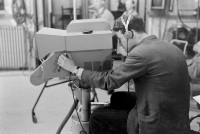SCREEN PLAYS
Intimate Theatre
Live from the Intimate Theatre, 1946-1949, part 3
In two previous posts I have outlined something of the BBC’s relationship with The Intimate Theatre in Palmers Green in the immediate post-war years. A ban by the Theatrical Management Association meant that the BBC was unable to mount outside broadcasts from mainstream theatres, and so the corporation was forced to rely on small rep houses for live theatre with an audience. Fo three years, the Intimate was the BBC’s mainstay for such theatre plays, with fourteen productions broadcast between December 1946 and August 1949. These were broadcast despite the often poor quality of the productions, frequent technical hitches and obstructive tactics of other producers and copyright holders. This third post concentrates on the difficulties of the later years and the final, fifteenth Intimate production which at the last minute had to be relocated to an Alexandra Palace studio. Continue reading
Live from The Intimate Theatre, 1946-1949, part 2
My previous post sketched the start of the story of The Intimate Theatre in Palmers Green and of the BBC’s outside broadcasts which began from there in December 1946. This second of three posts picks up the relationship with the second broadcast from N13, of the Broadway comedy Junior Miss. The television service of the time was unable to negotiate access to mainstream theatres because of the obstructive attitude of the Theatrical Management Association (TMA). But the owner of the Intimate, Fred Marlow, was prepared to deal directly with the BBC and as a consequence his modest rep house in north London provided fourteen live dramas over a period of three years. Continue reading
Live from The Intimate Theatre, 1946-1949, part 1
Between 1946 and 1949 the BBC broadcast fourteen productions from The Intimate Theatre, a modest repertory house in Palmers Green. These outside broadcasts from London N13 were a significant element in the schedules of the returning television service. Yet the stage productions had usually benefitted from only a week’s rehearsal before they were transmitted live by three cameras (which themselves seem to have suffered frequent breakdowns). The quality was patchy, at best, but the members of the Theatrical Management Association (TMA) were preventing the BBC from having access to more prestigious theatres. As a consequence, the broadcasts from The Intimate Theatre were the most significant engagement between the London stage and television in the immediate post-war years. Continue reading
